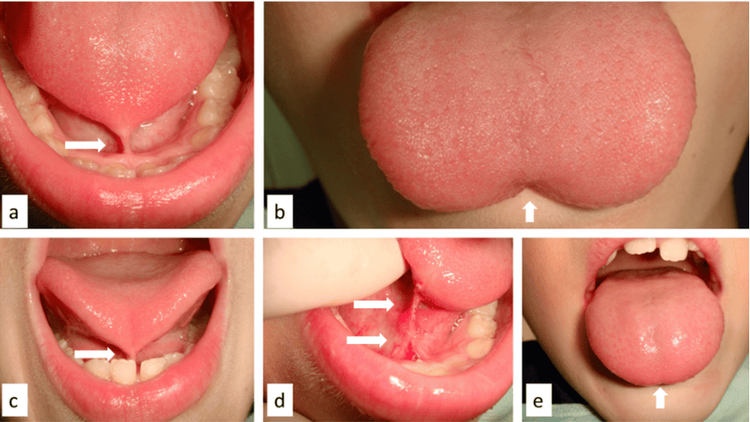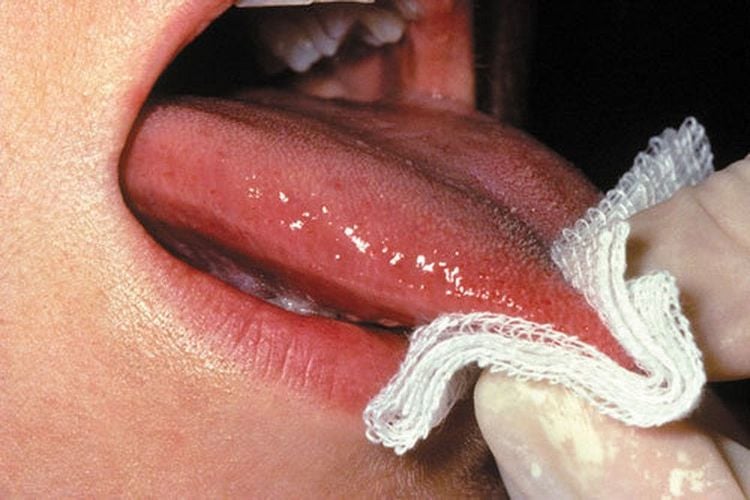This is an automatically translated article.
Hard tongue disease is one of the diseases of the tongue. This is a common birth defect in young children. In some cases, children can get better on their own as they get older. Some children need surgery to cure tongue stiffness due to difficulties in daily activities of children.
1. Diagnosis
Stiff tongue is an abnormality that is often concluded after a doctor's examination. For infants, the doctor may use a screening tool based on the shape and mobility of the tongue.
2. Treatment
How to treat tongue stiffness is still a controversial issue. Some experts believe that the earlier treatment is initiated, the more beneficial it is for the child. Preferably immediately, before the infant is discharged from the hospital. However, some other experts say that it is advisable to step back to consider a certain duration of treatment.
Tongue restraint may loosen on its own over time, and tongue stiffness may resolve on its own in children. In some cases tongue stiffness persists without causing any problems. Parents should seek advice from a lactation specialist and speech therapist to help their baby improve speech and sound early.
Surgical treatment to resolve tongue stiffness may be necessary in infants, children, and adults in cases where tongue stiffness causes limitations in daily activities or affects health.

Bệnh cứng lưỡi có thể được điều trị bằng phương pháp phẫu thuật
3. Tongue resection surgery
A simple minor surgery called a glossectomy can be performed with or without anesthesia in the hospital or in the doctor's office.
The surgeon will check the tongue brake and use sterile scissors to cut the tongue brake. This procedure is very quick. This is the least uncomfortable procedure because there are very few nerve endings or blood vessels in the fascia.
This procedure usually causes no bleeding, or only a drop or two. After the procedure, the mother can breastfeed the baby immediately.
Complications from this minor surgery are rare - but can include bleeding, infection, damage to the tongue or salivary glands. There may also be scarring or the tongue brake being reattached to the base of the tongue.
4. Rhinoplasty surgery
Another more commonly performed procedure to address tongue stiffness is called a tongue-brake plasty. This surgery will be indicated if the tongue brake is too thick and cannot be performed.
This blepharoplasty will be performed along with general anesthesia procedures using surgical instruments. After the tongue brake is removed, the wound is closed with dissolving sutures.
Possible complications of lingual fasciotomy are the same as those of glottis resection and are very rare. Complications include bleeding, infection, and damage to the tongue or salivary glands. Scarring may also occur after this surgery due to a reaction to the anesthetic/anesthesia medication.
After plastic surgery, the doctor will guide tongue exercises to help the patient increase the movement of the tongue and reduce the possibility of scarring

Tạo hình hãm lưỡi có thể gây nhiễm trùng lưỡi
5. What do you need to prepare when making a doctor's appointment?
Here is some information to help you prepare well for a consultation appointment with the Doctor. You need to prepare a list of questions like:
How serious is tongue stiffness? Does it need treatment? What are the treatment options? Should I need surgery? What factors lead to the need for surgery? What are the possible risks? Does surgery require anesthesia? Will surgery make my baby more likely to breastfeed/bottle? Surgery should be done in the doctor's office or in the surgical department. Do I need to consult an otolaryngologist or other specialist?

Khám bệnh sẽ giúp bạn giải đáp các thắc mắc về bệnh cứng lưỡi
6. What information you should give your doctor
The doctor will probably ask you some questions. For example:
When the baby suckles, does the baby have any difficulties? Does the child have any difficulty with pronunciation or taking care of his/her own teeth? Are the two lower front teeth of the child missing? Does your child worry about activities being restricted due to difficulty moving the tongue? You should anticipate your doctor's questions and should prepare in advance by writing them down on a piece of paper. Doing so will help you make the most of your time expressing your questions and concerns with your doctor.
Vinmec International General Hospital is a high-quality medical facility in Vietnam with a team of highly qualified medical professionals, well-trained, domestic and foreign, and experienced.
A system of modern and advanced medical equipment, possessing many of the best machines in the world, helping to detect many difficult and dangerous diseases in a short time, supporting the diagnosis and treatment of doctors the most effective. The hospital space is designed according to 5-star hotel standards, giving patients comfort, friendliness and peace of mind.
Please dial HOTLINE for more information or register for an appointment HERE. Download MyVinmec app to make appointments faster and to manage your bookings easily.
Reference source: mayoclinic.org













